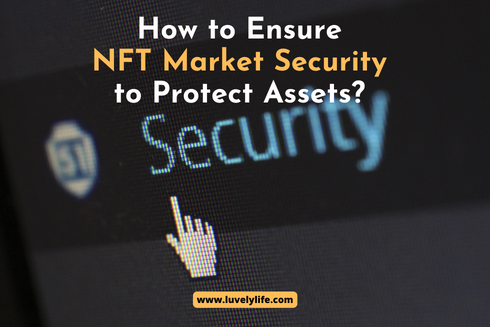How to Ensure NFT Market Security to Protect Assets
How to Ensure NFT Market Security to Protect Assets. The world of Non-fungible Tokens (NFTs) has witnessed an unprecedented surge in popularity, revolutionizing the way digital assets are bought, sold, and owned. NFTs represent unique digital items, artworks, collectibles, and more, backed by blockchain technology, making them scarce, provably authentic, and easily transferable. As the NFT market continues to grow, so does the importance of ensuring the security of these valuable assets.

In this article, we will delve into the critical aspects of NFT marketplace security and explore the measures that both NFT platforms and users can take to safeguard their digital assets. Understanding the potential risks and implementing best practices can mitigate the chances of falling victim to various threats prevalent in the NFT space.
The Risks and Challenges of NFT Marketplace Security
- Smart Contract Vulnerabilities
NFTs are typically governed by smart contracts deployed on blockchain networks, and these contracts are susceptible to coding errors and vulnerabilities. Exploiting such vulnerabilities can lead to unauthorized access to NFTs, allowing bad actors to steal or manipulate digital assets. - Phishing Attacks
Phishing attacks are a common threat in the NFT ecosystem, targeting users with fraudulent websites and emails that mimic legitimate platforms. Unsuspecting victims may unknowingly reveal their private keys or login credentials, providing attackers with access to their NFT wallets. - Fake NFTs and Scams
The rise in demand for NFTs has given rise to scams, where malicious actors create and sell fake NFTs, duping buyers into believing they own authentic digital assets. Such scams can result in significant financial losses for unsuspecting collectors. - Centralized Exchange Vulnerabilities
Many NFTs are bought and sold on centralized exchanges, which may have their own security vulnerabilities. If these platforms suffer from data breaches or hacking incidents, users' NFTs could be compromised.
Best Practices for NFT Marketplace Security
- Choose Reputable NFT Platforms
Selecting reputable NFT marketplaces is the first step in ensuring security. Research the platform's track record, user reviews, and security measures before conducting any transactions. Established platforms with robust security protocols are more likely to safeguard your assets. - Secure Your Digital Wallet
Your digital wallet holds the keys to your NFTs, so securing it is paramount. Use hardware wallets or well-established software wallets that employ strong encryption and authentication mechanisms. Avoid sharing your private keys or mnemonic phrases with anyone and store them offline in a safe location. - Verify NFT Authenticity
Before purchasing an NFT, verify its authenticity by cross-referencing details with official sources or the creator's profile. Analyze the metadata and blockchain records to ensure the legitimacy of the NFT. - Be Cautious of Phishing Attempts
Stay vigilant against phishing attempts. Avoid clicking on suspicious links, especially in emails or messages asking for your private information. Always access NFT marketplaces directly through their official websites. - Utilize Multi-Factor Authentication (MFA)
Enable Multi-Factor Authentication wherever possible. MFA adds an extra layer of security by requiring users to provide additional verification, such as a one-time code sent to their mobile device, along with their password. - Diversify Storage of NFTs
Consider diversifying the storage of your NFTs by using different wallets or custody solutions. This approach reduces the risk of losing all your assets in case of a security breach in a single wallet. - Educate Yourself
Stay informed about the latest security trends and threats in the NFT space. Continuous learning about security best practices will empower you to make informed decisions and protect your assets effectively.
NFT Platform Security Measures
- Smart Contract Audits
NFT platforms should conduct regular audits of their smart contracts by reputable security firms. These audits help identify and rectify vulnerabilities before they are exploited by malicious actors. - Two-Factor Authentication (2FA)
Implementing 2FA for user accounts adds an extra layer of protection for platform users. It ensures that even if login credentials are compromised, attackers cannot gain unauthorized access without the additional verification step. - Cold Wallet Storage
A significant portion of NFT assets should be stored in cold wallets (offline storage) rather than hot wallets (online storage). Cold wallets are less susceptible to hacking attempts and provide enhanced security for user funds. - SSL Encryption
NFT platforms must use Secure Socket Layer (SSL) encryption to secure communication between users' devices and their servers. SSL encryption ensures that sensitive data, such as login credentials and private keys, remains encrypted during transit. - User Education
Educating platform users about common security risks and best practices can significantly reduce the likelihood of successful attacks. Platforms should provide resources, guides, and notifications about security measures and potential threats.
Conclusion
The world of NFTs presents exciting opportunities for artists, collectors, and enthusiasts. However, it also attracts bad actors seeking to exploit vulnerabilities for personal gain. Ensuring NFT marketplace security is crucial to protect your valuable digital assets and safeguard the broader NFT ecosystem.
By following best practices, such as choosing reputable platforms, securing your digital wallet, and staying informed about the latest security trends, you can significantly reduce the risk of falling victim to common NFT security threats. Similarly, NFT platforms must prioritize security measures, including regular smart contract audits, 2FA implementation, and SSL encryption, to build trust and provide a safe environment for their users.
Remember, staying informed and being cautious is the key to enjoying the benefits of NFTs while minimizing the risks associated with this exciting digital frontier.

Post a Comment for "How to Ensure NFT Market Security to Protect Assets"